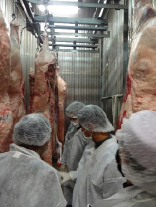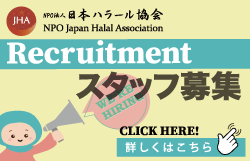Type of Halal Certification
Fields subject to the Association’s Halal Certification
The Association conducts audits of four types of halal certifications: products and raw materials, slaughter, restaurants and kitchens, and transportation, based on the certification standards for each. The fields and categories subject to the Association’s halal certification are as follows.
Categories of JHA Halal Certification
| Classification Cluste | Category | Subcategory | Examples of included activities | ||
| Farming | A | Farming | AⅡ | Farming of Fish and Seafood | ✓ Farming of fish for the production of seafood products ✓ Farming, trapping and fishing (including dismantling at fishing grounds) ✓ Including farm packing (b) and storage |
| Food and feed processing | C | Food Processing | CⅠ | Processing of perishable animal products | ✓ Fresh animal products including seafood, meat, eggs and dairy products |
| CⅡ | Processing of perishable plant products | ✓ Vegetable products including fruits and vegetables, fresh juices, vegetables, cereals, nuts and legumes | |||
| CⅢ | Processing of perishable animal and plant products (mixed products) | ✓ Pizza, lasagna, sandwiches, dumplings, instant foods and other fresh foods that are a mixture of animal and vegetable products | |||
| CⅣ | Processing of ambient stable products | ✓ Canned foods, biscuits, snacks, oil, drinking water, beverages, pasta, flour, sugar, salt, etc., foods that can be stored at room temperature | |||
| CⅤ | Animal Slaughtering
*CⅠfor SMIIC standards |
✓ Slaughter in slaughterhouses, production of carcass including cutting, processing and packaging | |||
| D | Animal Feed Production | DⅠ | Production of Feed | ✓ Food animal feed using single and mixed food ingredients | |
| Catering | E | Catering | E | Catering | ✓ Cooking and storage of meals to be consumed in impromptu or take-home form |
| Retail, transport and storage | G | Provision of Transport and Storage Services | GⅠ | Provision of Transport and Storage Services for Perishable Food and Feed | ✓ Warehouse facilities and delivery vehicles for the storage and transport of fresh produce and feed ✓ Including associate packing (C) |
| GⅡ | Provision of Transport and Storage Services for Ambient Stable Food and Feed | ✓ Warehouse facilities and delivery vehicles for storage and transportation of room temperature food ✓ Including associate packing (C) | |||
| Other | I | Production of Food Packaging and Packaging Material | I | Manufacture of food packaging materials | ✓ Production of food packaging material |
| Biochemical | K | Production of (Bio) Chemicals | K | Manufacture of chemical and biochemical products | ✓ Microorganisms, additives of food and feed, vitamins, minerals, media, enzymes, processing aids, supplements, insecticides, fertilizers, detergents, fibers, leather products, etc. |
| cosmetics
*LⅠ for SMIIC standards |
✓ Cosmetics | ||||
| perfume | ✓ Fragrances | ||||
| medicine | ✓ Pharmaceuticals | ||||
| Other
*LⅣ for SMIIC standards |
✓ Medical devices | ||||
| *b) “Farm packing” means packaging without product modification and processing.
*c) “Associated packaging” means packaging without product modification and processing and without altering the primary packaging. |
|||||
Halal Certification of Products and Raw Materials
Halal certification of products and raw materials is a major field of halal certification of our association, and currently about 70 companies have acquired halal certification for products and raw materials. About 70% of them are major raw material manufacturers, and there are conspicuous cases where they acquire halal certification for chemical raw materials, cosmetic raw materials, food additives, etc., which are often required to be halal-certified products for overseas export. In addition, we are continuously acquiring halal certification for consumer products such as soy sauce, miso, and tea used in Japan foods, which are deeply popular overseas. On the other hand, there are a certain number of cases where we have acquired halal certification but cannot continue sales or unfortunately cannot continue certification because it does not lead to an order. It is truly regrettable that we are unable to continue even though we have spent a lot of time, effort, and money to obtain certification. In addition, since our association also conducts certification audits with limited personnel, we recommend that you first carefully consider whether certification is really necessary or not before proceeding to acquire halal certification so that both companies and our association can work on halal certification more efficiently. It was once said in the media that “if you get halal certification, you can sell it”, but as long as it is halal certified, you will not be able to sell anything. First of all, it is necessary to consider halal certification as part of marketing.
Halal Certification for Restaurant Kitchens
As a halal certification for restaurants and kitchens, the Association has the following three types of certification schemes. Please consider each according to the actual situation.
- Halal Restaurant Certification Certification for stores where meals are completely halal and do not sell alcoholic beverages
- Muslim-Friendly Restaurant Certification Certification for restaurants where meals are completely halal and have alcoholic beverage sales. The difference from the above halal restaurant certification is that there is an alcoholic beverage sale.
- Kitchen certification This certification is for kitchens dedicated to halal, and mainly catered lunch boxes and in-flight meals correspond as industries. This does not apply to frozen lunch boxes or retort pouches.
All of these certifications include facilities, equipment, ingredients, menus, and halal management systems.
《Halal Certification for Restaurants》 Certifications for restaurants include Halal Restaurant Certification and Muslim-Friendly Restaurant Certification. On the other hand, there is a method of giving users a choice by disclosing information on the ingredients and seasonings used without obtaining certification. In the case of restaurants, since it is possible to directly communicate information by directly interacting with users (consumers), it may be sufficient to provide information so that users can decide whether to eat or not to eat. Especially if you run a private store, it can be said that it is an effective means for stores that can respond to customers individually. However, large stores and chain stores can be difficult to accommodate individual customers. Rather, no matter when or who asks for information about halal-ness, if you present content that can be understood at a glance, you can easily convey information. In this case, it can be said that halal authentication can be effectively utilized. As for information, a word with a strong element of confusion is “Muslim friendly”. Generally, when Muslims hear that they are “Muslim-friendly,” they understand that they are “halal” when it comes to eating. There is no understanding of “a little bit halal” or “I made it while thinking about Muslims”. We believe that it is difficult to secure the assurance of halal quality by segregating and separating in a limited space in restaurants that handle both non-halal and halal meat, and at restaurants subject to certification by our association, whether it is halal restaurant certification or a Muslim friendly restaurant, “meals are halal only”. The purpose of our certification for restaurants is “to ensure that users can use it with peace of mind”. Of course, ease of use on the part of the provider is also important. In addition, since the form of halal nature that can be tolerated by the user himself is also different for each user, the development of an environment in which both users and providers can receive and provide services with peace of mind will lead to the provision of sustainable services. Therefore, it is necessary to focus on not “compromising halality”, which is the biggest risk. I understand that this is a common understanding between the two sides, and I believe that the best way to do this is to create an environment that “provides only halal things.” It takes a little time, process, and effort, but you can ensure “safety and security” which is the basis of service. I am often asked, “I don’t get certified, but how can I provide services for Muslims?” There are guidelines that summarize such questions, so please refer to them. However, just because you have cleared this does not mean that you can obtain certification.
These guidelines describe what we believe to be the bare minimum. Also, if you can’t do this, it doesn’t mean you can’t provide services to Muslims, so as mentioned above, you can communicate with your customers and do just that.
Halal certification for slaughterhouses
It is a certification for slaughterhouses that slaughter halal animals, and halal certification is the most necessary and valid target. In recent years, halal wagyu beef has become popular all over the world, and it has come to rank high in the export of agricultural products. Only halal animals other than pigs, such as cattle, chickens, sheep, etc., are subject to halal certification, and are slaughterhouses dedicated to halal slaughter. Halal slaughter certification is the same as product certification and post-slaughter processes and halal management systems, but Muslim slaughterers and supervisors are required, and halal important management points are also different based on halal certification standards.

- Securing Muslim Human Resources
- Slaughterer
- supervisor
- Head Checker
- Halal slaughterhouse
- Production of carcass, including packing
- Halal Management System
Our Halal Slaughter Certification is recognized by the governments of Malaysia, Indonesia, Singapore and the UAE as a Halal Certification Body. The halal certification standards used are as follows. There are agreements in each country regarding the export of meat products, so please contact various organizations.
Halal Certification for Transportation and Warehouses
Transportation and warehousing certification for halal products within the halal supply chain is mainly subject to certification for the adaptation of the halal management system for operating them, except for facilities and equipment. It is an industry in which manufacturers play a role in transporting products that have been secured with halal properties in the halal supply chain, receiving them, temporarily storing them in warehouses, transporting customers’ products without harming halal properties, and safely delivering them to shipping and export destinations. We will remove all risks that may impair halal-ness while handling halal products, and ensure that halal-ness is ensured through thorough management methods. Even overseas, there are few companies that can obtain certification in this field, and there is little traffic of halal products in Japan, so it is a certification of an industry that can not be said to be in demand, but there are companies that are working with the corporate spirit of wanting to provide services as one of the options of customers in an advanced manner.





